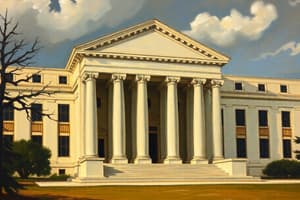Podcast
Questions and Answers
What is the definition of a central bank?
What is the definition of a central bank?
- A local bank serving individual customers
- An organization that manages investment funds
- A bank that only lends money to corporations
- The bank within a nation that is responsible for creating monetary policy (correct)
What does it mean to implement?
What does it mean to implement?
Use to complete a specific action.
What is a reserve?
What is a reserve?
To set aside or hold for another.
What are securities?
What are securities?
Why do economists study the money supply?
Why do economists study the money supply?
What are the main goals of monetary policy?
What are the main goals of monetary policy?
What is a recession characterized by?
What is a recession characterized by?
What does the central bank aim to influence through monetary policy?
What does the central bank aim to influence through monetary policy?
What is the liquidity of the money supply related to?
What is the liquidity of the money supply related to?
What is the goal of expansionary monetary policy?
What is the goal of expansionary monetary policy?
Expansionary policy always leads to reduced inflation.
Expansionary policy always leads to reduced inflation.
What does contractionary monetary policy aim to achieve?
What does contractionary monetary policy aim to achieve?
What established the Federal Reserve?
What established the Federal Reserve?
Who manages the Federal Reserve?
Who manages the Federal Reserve?
What are some functions of the Federal Reserve?
What are some functions of the Federal Reserve?
What are the tools of the Federal Reserve?
What are the tools of the Federal Reserve?
How does the Federal Reserve influence the money supply?
How does the Federal Reserve influence the money supply?
What happens when the money supply increases?
What happens when the money supply increases?
How does changing interest rates affect banks?
How does changing interest rates affect banks?
What happens when the amounts required for banks to hold in reserve are changed?
What happens when the amounts required for banks to hold in reserve are changed?
How does the Fed respond to recessions?
How does the Fed respond to recessions?
Flashcards are hidden until you start studying
Study Notes
Central Bank and Monetary Policy
- Central banks are responsible for creating and overseeing monetary policy within a nation.
- Monetary policy aims to control inflation and reduce unemployment.
- Central banks manipulate the money supply to navigate the economy between recession and growth.
Understanding Money Supply
- Economists analyze the money supply by categorizing it according to liquidity levels.
- The liquidity of the money supply affects lending capabilities, interest rates, investment levels, and overall economic growth.
Monetary Policy Types
- Expansionary monetary policy increases the money supply to lower unemployment by making credit more available and decreasing interest rates.
- Expansionary measures may lead to increased inflation as higher lending and investment rates can accelerate price changes.
- Contractionary monetary policy aims to decrease inflation by reducing the money supply, limiting credit access, and raising interest rates.
The Federal Reserve (The Fed)
- Founded by the Federal Reserve Act of 1913, The Fed serves as the central bank of the United States, managing monetary policy through twelve district banks.
- Managed by a board of governors, The Fed controls lending activities of banks and monetary policy decisions through the Federal Open Market Committee.
Functions of The Federal Reserve
- Acts as a bank for financial institutions, lending money, storing funds, regulating banking behaviors, and serving as a lender of last resort.
- Key tools include open market operations, interest rate adjustments, and reserve requirements.
Influence of Securities and Interest Rates
- The Fed can buy and sell securities to manage the money supply—buying securities provides banks with more capital to lend, while selling securities restricts their lending capacity.
- Modifications to the money supply directly impact the Federal Funds Rate, with increased supply lowering interbank lending rates.
Interest Rate Management
- The Fed can adjust interest rates charged to banks, influencing their available funds for lending—lower rates enable more lending, higher rates restrict it.
- Interest rates paid by The Fed to banks for stored funds can also be altered, affecting banks' cash flow and lending capabilities.
Reserve Requirements
- Banks are mandated by law to hold a portion of their funds in reserve; changes to these requirements affect their lending potential.
- During recessions, The Fed reacts by boosting the money supply through various actions, including purchasing securities and lowering interest and reserve requirements.
Studying That Suits You
Use AI to generate personalized quizzes and flashcards to suit your learning preferences.




